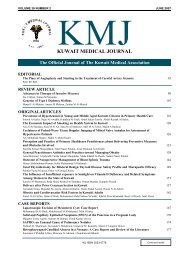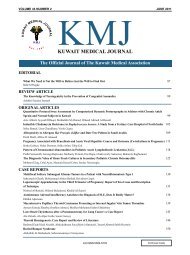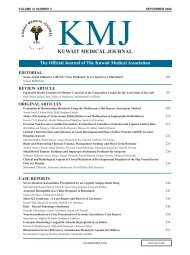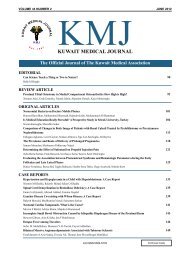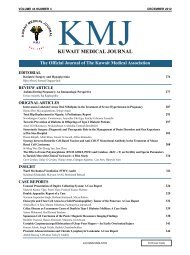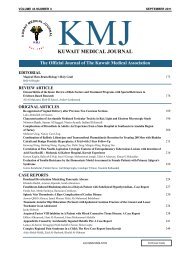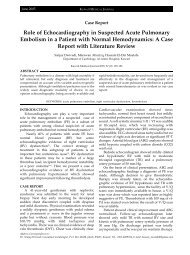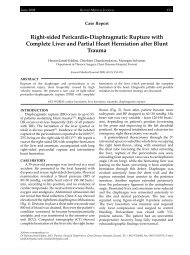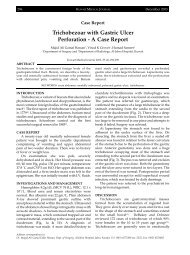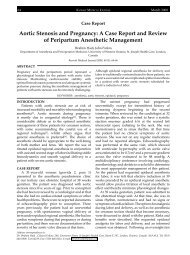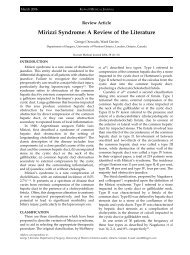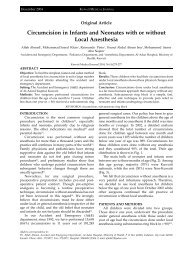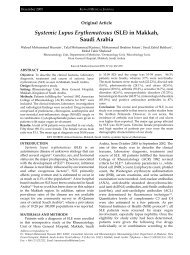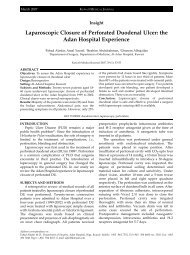June 09-41-2.indd - Kma.org.kw
June 09-41-2.indd - Kma.org.kw
June 09-41-2.indd - Kma.org.kw
Create successful ePaper yourself
Turn your PDF publications into a flip-book with our unique Google optimized e-Paper software.
126Evaluation of Problem Based Learning by Tutors and Students in a Medical Faculty of Turkey<strong>June</strong> 20<strong>09</strong>Table 5: Mean scores obtained from responses of both tutors and students to the suggestions of PBL’s contribution in certain subjectheadingsSubject headingsInterpersonal relationships, adaptation to teamworkSkill of telling the information gained to the othersDeveloping the skill of communicationSelf-directed learning and use of resource tutorsDeveloping the skill logical thinkingUsing the information sources like library and internet for accessto informationProblem solving skillDeveloping the skill of decision-takingIntegrating obtained knowledgeSkill of selecting useful information among information sourcesIncreasing the motivation for learningThe development of the skill of approaching the patient as abiopsychosocial wholeTutors Students Statistical analysesMean SD Mean SD p-value t*3.813.793.723.613.573.603.613.433.333.343.403.291.080.930.940.910.950.990.970.9<strong>41</strong>.010.9<strong>41</strong>.011.023.703.743.953.633.853.573.883.873.713.193.813.831.051.051.051.181.061.130.990.971.101.281.081.080.340.650.050.890.010.810.010.000.000.2430.000.00-0.95-0.451.960.132.35-0.232.423.923.12-1.163.374.37* Independent sample t-testconcluded that PBL is useful in teaching especiallyof basic sciences in medical education and it helpsthe students to acquire skills which are crucialcomponents of education.On the other hand, it is an interesting findingthat the tutors employed in surgical sciences werethose who were least content with PBL. When theresponses of this group to the open-ended questionsaimed at determining the opinion and suggestionsabout PBL were examined, it was determined thatsome problems were mentioned in their answers.These problems were the time-consuming natureof PBL, the difficulty of allocating time for PBLwhile being busy with the routine tasks, the burdenof acting as orientators for a topic in which they arenot competent, and the lack of their faith in PBL. Inorder to solve these problems, attempts were madeto assign the tutors to PBL sessions once in everyterm and particularly to modules that are closelyrelevant to their branches.The part of the questionnaire entitled “Youropinion and suggestions about PBL” helpeddetermine points on which the tutors and studentswould like to see the greatest improvement.According to this part of the questionnaire, thetutors asked for the selection of topics that aresusceptible to self-directed learning and convenientto be discussed comprehensively and demandedbetter construction of scenarios. The students, onthe other hand, requested tutors to attend the PBLmodules well-prepared and have a participationstandard. Moreover, they have requested betterselection of PBL topics. All these requests are andwill be taken into consideration in the processof planning and developing educational andinstructional activities.CONCLUSIONOur results show that PBL is well received by thetutors and students in AUFM and PBL is acceptablein a Turkish setting of undergraduate medicaleducation in our faculty.ACKNOWLEDGMENTSThe authors thank the Akdeniz UniversityResearch Fund for financial support.REFERENCES1. Finucane P, Nichols F, Gannon B, Runciman S, PrideauxD, Nicholas T. Recruiting problem based- learning(PBL) tutors for a PBL-based curriculum: the FlindersUniversity experience. Med Educ 2001; 35:56-61.2. Elliott M. Are we going in the right direction? Asurvey of the undergraduate medical education inCanada, Australia and the United Kingdom from ageneral practice perspective. Med Teach 1999; 21:53-60.3. Maudsley G. Do we all mean the same thing by“problem-based learning”? A review of the conceptsand a formulation of the ground rules. Acad Med1999;74:178-185.4. Coles CR. Differences between conventional andproblem-based curricula in their students’ approachesto studying. Med Educ 1985; 19:308-3<strong>09</strong>.5. Newble DI, Clarke RM. The approaches to learning ofstudents in a traditional and in an innovative problembasedmedical school. Med Educ 1986; 20:267-273.6. Dolmans D, Schmidt H. The advantages of problembasedcurricula. Postgrad Med J 1996; 72:535-538.7. Blumberg P, Michael JA. Development of self-directedlearning behaviours in a partially teacher-directed,problem-based learning curriculum. Teach LearnMed 1992; 4:3-8.8. Hill J, Rolfe IE, Pearson SA, Heathcote A. Do juniordoctors feel they are prepared for hospital practice?



